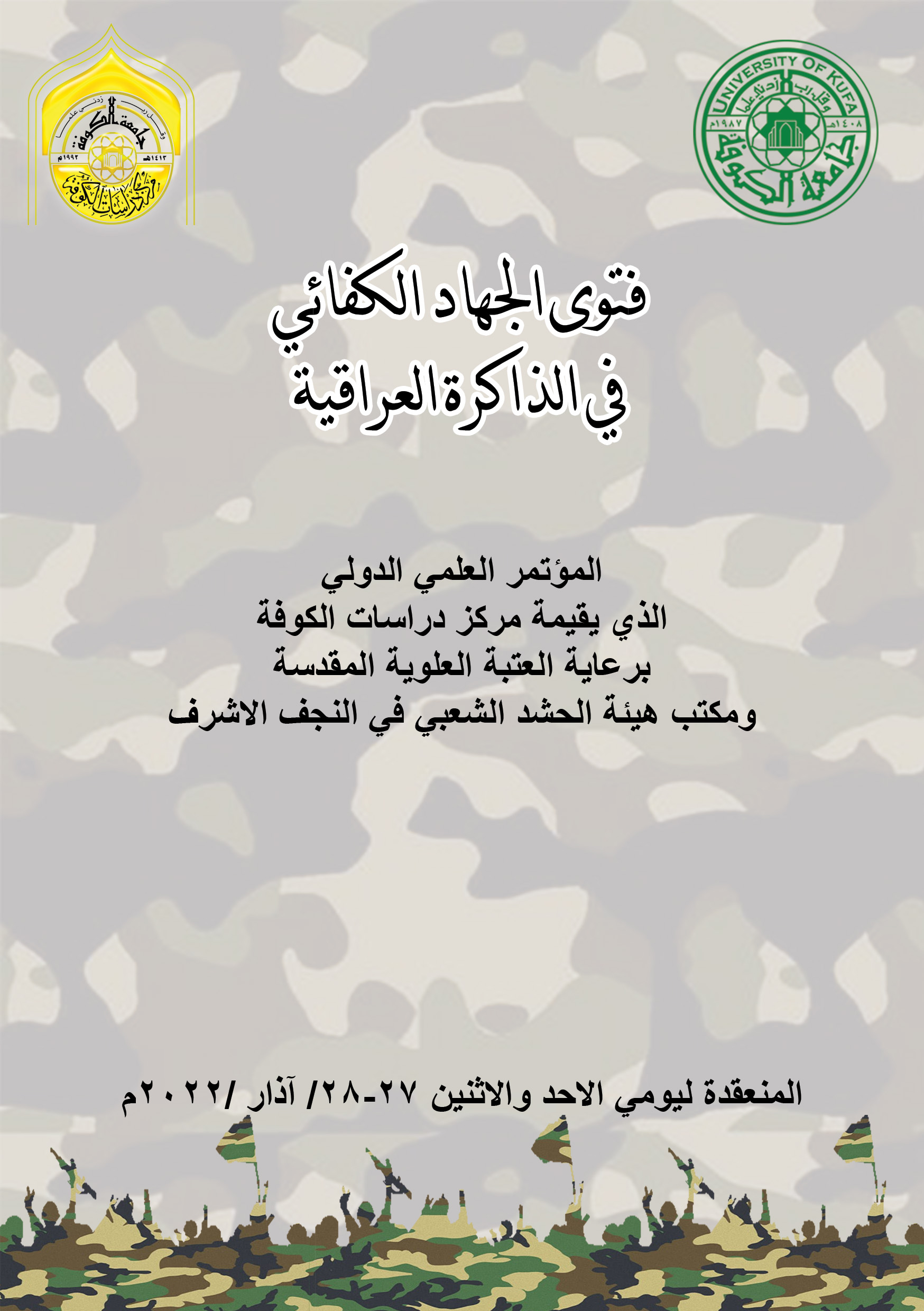Deconstructing the reference discourse in recalling the fatwa of jihad
DOI:
https://doi.org/10.36322/jksc.v2i69.13168Keywords:
Deconstruction, reference discourse, recall, Jihad fatwaAbstract
The religious authority transformed its direct speech through the Friday sermon through its agents in Karbala (the Husseini plate), and it is limited to only two people, Sheikh Abdul Mahdi Al-Karbalai, Secretary-General of the Husseiniya Shrine, and Mr. Ahmed Al-Safi, Secretary-General of the Abbasid Shrine, and through them the written messages of the reference are transmitted without the intervention of the preacher, (if any), because these messages do not exist permanently, but as a result of their need, the preacher reads them in the second sermon, and does not change anything in them, due to the fact that the reference changed the context Fatwas and visions related to the political aspect, after refraining from meeting all politicians (holding them responsible for the deterioration in the Iraqi situation), so the new context of the speech of the reference was in the form of a speech in which the oral paths are used through the preacher and written through the text sent from it, read by the preacher, and presented on a special site for the reference office, due to many reasons, including that the reference chose a complete rhetorical ritual in which its visions and fatwas were presented, and that ritual included discursive contexts that help to deliver messages to the public, Complete contexts, including (the place), which is the Husseini Mosque and its spiritual relationship with the Shiites, the second is for visions to reach everyone, because data does not necessarily reach everyone, while through the sermon, it reaches the illiterate and the reader, and this is one of the views presented in anthropology that oral discourse is faster to reach the audience than the written.
The religious authority practices various means of discourse with the public, but at the same time it practices measuring the degree of relationship with the public, taking the gradation in the discourse as the first of those measures, so it does not give the required until after measuring that relationship through gradation and accompaniment, as it keeps pace with them, and what they feel and then gives the new, because it provides the new continuously even if the event is similar, the new means that the reference wants permanent communication with the Shiite public, for example when asked about the elections, and although the mechanism The electoral one was the answers of the reference give new things in each question, taking into account not contrary to the first, because the public represents the first goal in the Shiite discourse, starting from the speeches of the infallible imams (peace be upon them), including the saying of Imam Hussein (peace be upon him): (The happy and happy sent to me your messages that you do not have an imam) This means that the imam exercises the role of measuring obedience to the public, and the relationship of the public with the imam is the relationship between the believers and the representative of the faith, and this is what is observed in the speech of the reference Religious it keeps pace with the public and speaks rhetoric sometimes and guidance at other times, and thus there is a different speech for those obedient to its orders as it provided them with the highest descriptions of praise;
Downloads
References
-القرآن الكريم
ابن منظور، لسان العرب، محمد بن مكرم الأفريقي المصري (ت 711هـ) – دار صادر، بيروت، الطبعة الأولى.
بسام قطوس، دليل النظرية النقدية المعاصرة: مناهج وتيارات، دار فضاءات للنشر والتوزيع، الاردن، 2016.
سمر الديوب، مصطلح الثنائيات الضدية، مجلة عالم الفكر، العدد1، المجلد41، الكويت، سنة2012.
فرينيالد هالين، من التأويلية إلى التفكيكية، من كتاب بحوث في القراءة والتلقي، ترجمة محمد خير البقاعي، مركز الانماء الحضاري، سوريا، 1998.
مايكل كاريذرس، لماذا ينفرد الانسان بالثقافة: الثقافات البشرية نشأتها وتنوعها، ترجمة شوقي جلال، سلسلة عالم معرفة، الكويت، العدد229، 1998.
المحقق النراقي، عوائد الأيام، دار الهادي للطباعة والنشر، بيروت، 2000.
مروان علي حسين، التفكيكية عند جاك دريدا، مجلة الكلية الاسلامية الجامعة، النجف الاشرف، العدد41، المجلد2، 1997.
نيكولاس رويل، ما التفكيكية، من كتاب ألوان التفكيكية: دليل المستخدم، اعداد نيكولاس رويل، ترجمة عبد الوهاب علوب، المركز القومي للترجمة، القاهرة، 2014.
Downloads
Published
How to Cite
Issue
Section
License
Copyright (c) 2023 د.عدنان صبيح

This work is licensed under a Creative Commons Attribution 4.0 International License.
Permit others to distribute and copy the manuscript, to create extracts, abstracts, and other revised versions, adaptations, or derivative works of or from the manuscript (such as a translation), to include in a collective work, to text or data mine the article, even for commercial purposes, as long as they credit the author(s), do not represent the author as endorsing their adaptation of the article, and do not modify the article in such a way as to damage the author''''s honor or reputation. Further details are found at Creative Commons Attribution 4.0 International (CC BY 4.0)






























